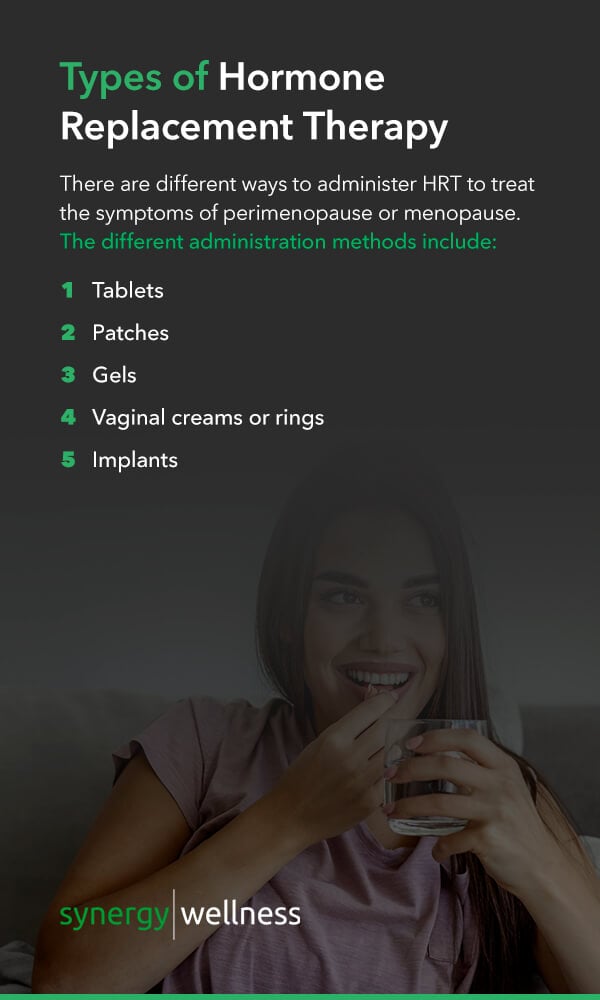
When women reach menopause, they may experience uncomfortable symptoms that impact their quality of life. You may feel hot when everyone else feels cold, or you may wake up in the middle of the night sweating. Your monthly cycle starts to become irregular, and it’s challenging to regulate your emotions.
Many women look for methods to find relief and often turn to hormone replacement therapy (HRT) to treat these menopause symptoms. HRT can be effective for many women, but others have to look for alternatives for their comfort. Below, we’ll guide you through menopausal symptoms and menopausal hormone therapy to help you find a possible treatment method.

What Is Menopause?
Menopause is a condition that affects every woman at some point in their life. Menopause begins 12 months after a woman experiences her last period. Before this happens, a woman will experience changes to her cycle and various other symptoms, referred to as perimenopause.
Menopause starts at a different time for each person and can begin anytime between 45 and 55. The average onset age is 51. Menopause lasts around seven years but can go as long as 14 years.
What Happens to Hormone Levels During Menopause?
When perimenopause or menopause begins, the production of hormones like estrogen and progesterone starts to vary significantly. As the hormones start to slow, they stop a woman’s menstrual cycle. The hormone fluctuations can cause various symptoms, most notably being hot flashes. Some of the other symptoms a woman might experience during this stage include:
- Irregular periods
- Night sweats
- Sleep disturbances
- Mood changes
- Vaginal dryness
- Weight gain
- Brain fog
- Decreased breast fullness
- Pain during sex
These symptoms won’t affect every postmenopausal woman. Still, some will experience these symptoms well before menopause begins and hormone levels start to fluctuate significantly, which can greatly affect their quality of life.
How Does Hormone Replacement Therapy for Menopause Work?
The hormone fluctuations that occur as women get older can severely impact their physical, mental and emotional health. Hormone treatment for menopause rebalances the hormones in the body by reintroducing them into the system. The goal of HRT is to limit or reduce perimenopause or menopause symptoms as they start to appear to improve your quality of life.
When you start HRT, you’ll take estrogen, progesterone or a combination of both. The hormones you take will vary based on your individual needs determined by your doctor. Most of the time, you’ll be given some combination of estrogen and progesterone. Taking estrogen alone without the balance of progesterone can sometimes encourage the growth of the uterus lining. When this happens, the risk of endometrial cancer increases.
However, if you’ve had your uterus removed, it may not be necessary to take progesterone. Your doctor can help you determine what hormones are required to rebalance your body and reduce the severity of your menopause symptoms.
Who Should Consider HRT?
HRT can be beneficial for many postmenopausal women. If you’ve started to experience menopause symptoms and they range from moderate to severe, you can work with your doctor to determine if HRT is right for you. Many women report relief from their menopause symptoms after starting HRT.
Additionally, if osteoporosis runs in your family, you should consider HRT. Rebalancing the hormones in the body can strengthen the bones and prevent fractures from mild stressors, such as falls.

Who Should Avoid HRT?
HRT isn’t always effective at treating menopause symptoms in every woman, and some women see little to no improvements. If your menopause symptoms are mild, you might not notice a significant difference from HRT. Some women also don’t experience any symptoms from perimenopause or menopause, meaning they wouldn’t be candidates for HRT.
Certain individuals should avoid HRT altogether. Women over 60 typically shouldn’t use HRT to treat menopause symptoms because it can increase the risk of stroke, blood clots, dementia and heart disease. These risks are also a factor in women who start HRT 10 years after the onset of menopause.
Having a family or medical history of certain conditions can also increase the risks of HRT. If you have a family history of the following conditions, currently have one of these conditions or have had them in the past, consult with your doctor before starting HRT:
- Heart disease
- Uncontrolled high blood pressure
- Uncontrolled hypertension
- Blood clots
- Stroke
- Extreme migraines
- Breast, endometrial or ovarian cancer
Pros of Hormone Replacement Therapy in Menopause
Many women seek out HRT for the vast array of benefits to relieve their perimenopause or menopause symptoms. Some of the potential benefits of starting HRT include:
- Reduces hot flashes and night sweats
- Improves sleep
- Reduces vaginal dryness
- Strengthens bones
- Reduces pain from hormone fluctuation
- Improves balance and coordination
- Improves mental clarity
- Regulates weight fluctuations
HRT can also improve collagen production, which contributes to healthy and youthful skin. Collagen helps your skin stay firm and elastic, reducing wrinkles and fine lines.
Cons of Hormone Replacement Therapy in Menopause
There are some cons of using HRT to treat perimenopause or menopause symptoms. These mainly affect women over 60, those who started HRT 10 years after the onset of menopause or those using HRT only to treat osteoporosis rather than menopause. The potential drawbacks include:
HRT may also come with some side effects, but these tend to go away after the first few weeks of treatment and can be reduced by altering the dose. Some of the possible side effects include:
- Breast tenderness
- Mood swings
- Bloating
- Headaches
- Depression or anxiety
- Acne
- Back and abdominal pain
If your side effects last longer than a few weeks after beginning HRT, you should talk with your doctor to determine the cause. You may just need to adjust your dosage or make other changes.
Weighing Risks and Benefits of MHT
Every woman is different and will be affected differently by menopausal hormone therapy (MHT). MHT isn’t a one-size-fits-all type of treatment. You first have to determine how your perimenopause or menopause symptoms affect your life. Some women experience more severe symptoms than others.
Talk with your doctor openly about your symptoms and how they’re impacting your quality of life. Once you start MHT, your doctor will monitor your dose and your hormone levels to determine if any changes need to be made to give you relief from your symptoms. Finding the right combination of hormones and the appropriate dose may take some time.
It’s understandable to be concerned about some of the risks associated with MHT. You should talk with your physician to determine if MHT will benefit you or if the risks are too great. They’ll look at your medical and family history to assess your risk levels and make recommendations based on their findings.
A transdermal application absorbed through the skin can reduce some of the risks and side effects of MHT. For example, some women choose transdermal applications, such as a patch, to reduce migraines or their risk of cardiovascular disease.
You can also look at other ways to reduce the risks of MHT. For example, if you have a family history of breast cancer and want to use MHT to treat your perimenopause or menopause symptoms, you can make regular appointments for mammograms to determine the health of your breasts.
Overall, you should weigh the benefits and risks of MHT with your doctor. You and your doctor are the only ones who can determine if MHT is worth the risks and will improve your quality of life.

Types of Hormone Replacement Therapy
There are different ways to administer HRT to treat the symptoms of perimenopause or menopause. The different administration methods include:
- Tablets: You’ll typically take a tablet orally once a day to deliver the hormones to your body. Estrogen-only and combination HRT are available through tablets. Depending on your lifestyle, oral tablets may be the best option. It’s important to note that some of the risks associated with HRT increased with tablets than other forms of administration, such as blood clots.
- Patches: Patches are a popular method to deliver hormones to your system. All you have to do is apply the patch to your skin and replace it every few days. Unlike tablets, patches likely won’t increase the risks of blood clots. If you’re concerned about experiencing some of the risks of HRT, you might choose patches to potentially limit complications.
- Gels: Gels are similar to patches since they’re applied to the skin. You’ll need to apply the gel once a day to get the full effect of HRT. Gel has also been found not to increase the risks of blood clots. However, if you still have your uterus, you’ll need to take progesterone as well to help reduce your risk of endometrial cancer.
- Vaginal creams or rings: You can deliver hormones to your body by using a vaginal cream or inserting a ring. You might choose this method if you experience pain during sex or vaginal dryness, but this administration method hasn’t been shown to relieve other menopause symptoms, such as hot flashes. This method likely won’t come with the associated risks of other HRT methods, so you won’t need to take progesterone separately, even if you still have your uterus.
- Implants: Implants are small pellets that are placed under the skin. The hormones are gradually released over time and can last for several months before they need to be replaced. Like gels, if you still have your uterus, you’ll need to take progesterone separately to help reduce your risk of endometrial cancer. Implants are a convenient form of HRT that doesn’t require you to remember to take a tablet or apply a gel every day.
The right application method will be based on your individual needs and concerns. Talk with your doctor about which method is right for you.
Alternatives to Treating Menopause With HRT
HRT doesn’t work for every woman looking to reduce her menopause symptoms, and others can’t take it due to an increased risk of cancer or cardiovascular disease. The good news is that potential alternatives are available for women who are seeking relief.
Women concerned about some of the health effects of hormonal changes can choose different alternatives to treat some of these effects. Some of the other options include:
- Dietary changes: As you get older, the bones become weaker, and conditions such as osteoporosis become more likely. Eating a diet rich in certain vitamins can help prevent bone loss. Round out your diet with foods high in calcium and vitamin D, nutrients that are known to protect the bones. You can also speak to your doctor about taking dietary supplements to ensure you’re getting a full dose of these nutrients each day.
- Bioidentical hormone replacement therapy: Bioidentical HRT uses hormones derived from plants, such as yams or soybeans. Hormones are created in a lab using plant compounds and are considered a natural alternative to synthetic hormones. These hormones mimic the hormones we naturally produce in our bodies and can treat menopause symptoms. Your body can metabolize bioidentical hormones the same way we would naturally metabolize our own, reducing the risks associated with synthetic HRT. Many people turn to bioidentical HRT as a natural remedy.
- SSRIs and SNRIs: Selective serotonin reuptake inhibitors (SSRIs) and serotonin and norepinephrine reuptake inhibitors (SNRIs) are commonly used to treat depression, anxiety and other mood disorders. However, SSRIs and SNRIs have also been shown to be effective at treating menopause symptoms in women, such as hot flashes. Before starting treatment with SSRIs and SNRIs, talk with your doctor about the potential side effects to determine if they’re right for you.
- Anticonvulsant drugs: Gabapentin is an anticonvulsant drug commonly used to treat nerve pain or seizures caused by epilepsy. However, this drug has also been shown to be effective at treating hot flashes related to menopause. Hot flashes are one of the most common symptoms of menopause, and gabapentin can be an effective treatment method for women looking to improve their quality of life.
If you’re looking for an alternative to HRT to treat perimenopause or menopause symptoms, consult with your doctor first to determine the right option for you.
Treating Menopause With Bioidentical Hormone Replacement Therapy in Bakersfield, CA
Menopause will inevitably affect every woman as she grows older, but that doesn’t mean it’s necessary to live with the uncomfortable symptoms. Bioidentical hormone replacement therapy is a natural remedy that can effectively reduce the symptoms of menopause to improve your quality of life.
Estrogen therapy for menopause can alleviate menopause symptoms and help address the signs of aging, making you look and feel younger. We implant estrogen pellets under the skin so hormones are gradually released over time, allowing you to get back to living life to the fullest. Contact us today to learn more about how we can help you find relief or schedule an appointment.




